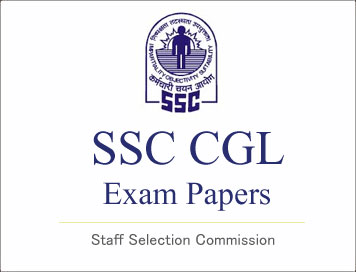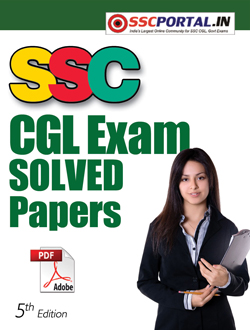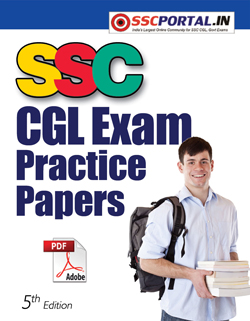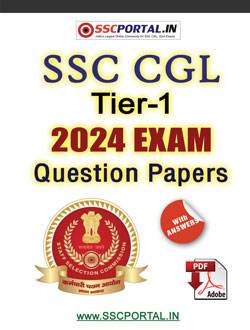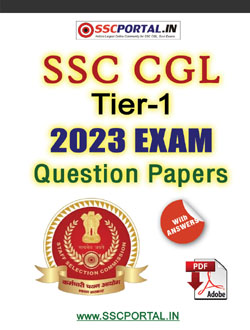NEW! SSC CGL PDF NOTES
SSC CGL (Tier - 1) Exam Solved Paper - 2011 "English Comprehension" (1st shift)
SSC CGL (Tier - 1) Exam Solved Paper - 2011 "English Comprehension" (1st shift)
Subject: English Comprehension
Directions (1-5): In the following question, some of the sentences have errors and some are correct. Find out which part of a sentence has an error. The number of the part is you answer. If a sentence is free from errors, then you answer is (d) i.e., No error.
1. A senior doctor (1) / expressed concern (2) / about physicians recommended the vaccine. (3) / No error. (4)
2. We have discussing (1) / all the known mechanisms (2) / of physical growth, (3) / No error. (4)
3. Children enjoy listening to (1) / ghosts stories (2) / especially on Halloween night. (3) / No error. (4)
4. I (1) / have (2) / many works to do. (3) / No error. (4)
5. There are so many filths (1) / all around (2) / the place. (3) / No error. (4)
Directions (6–10): In the following questions, sentences are given with blanks to be filled in with an appropriate word. Four alternatives are suggested for each question. Choose the correct alternative out of the four.\
6. The building is not safe and must be _____ down.
(a) pull
(b) pulling
(c) pulled
(d) pulls
7. There is something wonderful ___ him.
(a) of
(b) about
(c) for
(d) inside
8. The song in the play cannot be deleted it is ____ to the story.
(a) intervened
(b) innate
(c) exacting
(d) integral
9. She remained a _____ all her life.
(a) spinster
(b) bachelor
(c) unmarried
(d) single
10. Do not stay in the grasslands after dark, as some animals become ____ when they see humans.
(a) provoked
(b) alerted
(c) aggressive
(d) threatened
Directions (11-15): In the following, questions out of the four alternatives, choose one which best expresses the meaning of the given word.
11. LUCIDITY
(a) Fluidity
(b) Politeness
(c) Clarity
(d) Fluency
12. INDICT
(a) Implicate
(b) Elude
(c) Appreciate
(d) Judge
13. DELUGE
(a) Confusion
(b) Deception
(c) Flood
(d) Weapon
14. PREPONDERANCE
(A) Pre-eminence
(B) Dominance
(C) Domineering
(D) Preoccupation
Directions (16-20): In the following question no. 66 to 70, out of the four alternatives, choose the word opposite in meaning to the given word.
16. INVINCIBLE
(a) Small
(b) Invisible
(c) Vulnerable
(d) Reachable
17. INOFFENSIVE
(a) Sensitive
(b) Organic
(c) Sensible
(d) Rude
18. DIVULGE
(a) Conceal
(b) Disguise
(c) Oppress
(d) Reveal
19. DISCORD
(a) Harmony
(b) Serenity
(c) Acceptance
(d) Placidity
20. MAMMOTH
(a) Quiet
(b) Significant
(c) Huge (d) Small
Directions (21-25): In the following four alternatives are given for the meaning of the given Idiom/Phrase. Choose the alternative which best expresses the meaning of the Idiom/Phrase.
21. To take to heart
(a) to be encouraged
(b) to grieve over
(c) to like
(d) to hate
22. Yeoman’s service
(a) medical help
(b) excellent work
(c) social work
(d) hard work
23. To face the music
(a) to enjoy a musical recital
(b) to bear the consequences
(c) to live in a pleasant atmosphere
(d) to have a difficult time
24. To put up with
(a) to accommodate
(b) to adjust
(c) to understand
(d) to tolerate
25. To call it a day
(a) to conclude proceedings
(b) to initiate proceedings
(c) to work through the day
(d) None of the above
Directions (26-30): In the following questions, a sentence or bold part thereof is given which may need improvement. Alternative are given at (A), (B) and (C) below, which may be a better option. In case, no improvement is needed, your answer is (D).
26. The man whom I thought was thoroughly honest proved to be a swindler.
(a) The man whom I thought was thoroughly honest proved as swindler.
(b) The man who I thought was thoroughly honest proved to be a swindler.
(c) The man to whom I thought was thoroughly honest proved to be a swindler,
(d) No improvement
27. No sooner had the dividend been declared, the notices were sent out.
(a) The company had hardly declared the dividend till the notices were sent for mailing.
(b) They had no sooner declared to dividend then the notices were sent out.
(c) Hardly had the dividend been declared than the notices were sent out.
(d) No improvement.
28. Riding upon his horse, the tiger jumped at him.
(a) Riding upon the tiger, the horse jumped at him.
(b) The tiger jumped at him while he was riding upon his horse
(c) The tiger rode at him while he was jumping upon his horse.
(d) No improvement
29. I in black and white must have your terms down.
(a) I must have in black in white your terms down.
(b) I must have your terms in black and white down.
(c) I must have your terms down in black and white.
(d) No improvement.
30. When we are came out of the restaurant it was half past eleven.
(a) When we had come out of the restaurant
(b) After we came out of the restaurant
(c) When we have come out of the restaurant
(d) No improvement
Directions (31-35): In the following questions, out of the four alternatives, choose the one which can be substituted for the given words/sentence.
31. Code of diplomatic etiquette and precedence
(a) Statesmanship
(b) Diplomacy
(c) Hierarchy
(d) Protocol
32. To renounce a high position of authority or control
(a) Abduct
(b) Abandon
(c) Abort
(d) Abdicate
33. Not to be moved by entreaty
(a) Rigorous
(b) Negligent
(c) Inexorable
(d) Despotic
34. An object or portion serving as a sample
(a) Specification
(b) Spectre
(c) Spectacle
(d) Specimen
35. The practice of submitting a proposal to popular vote
(a) Election
(b) Reference
(c) Popularity
(d) Referendum
Directions (36-40): In the following questions, groups of four words are given. In each group, one word is correctly spelt. Find the correctly spelt word.
36.
(a) mandatary
(b) circulatory
(c) temporary
(d) regulatory
37.
(a) convinience
(b) initative
(c) concessional
(d) exaggerate
38.
(a) diologue
(b) giraffe
(c) scissors
(d) humourous
39.
(a) assiduous
(b) nefarious
(c) macabre
(d) loquacious
40.
(a) cortege
(b) damage
(c) milege
(d) plumege
Directions (41-50): In the following passage some of the words have been left out. First read the passage over and try to understand what it is about. Then fill the blanks with the help of the alternative given.
Passage
Science means knowledge, but not all knowledge is science. I know from my own eyesight that our dog Chippy lies papaya; I know from a book that Akbar was the (191) of Babar, and (192) in 1605; and I know (193) the ratio that India did not do well in the (194) Test matches. We can call these (195) of knowledge (196) but they are not science.
Science (197) with facts, but not with facts which have (198) to do with each other, like the facts about our dog, cricket and the Mughal ruler; those facts are not related (199), and so have nothing (200) with science. Science stars with observation.
41.
(a) grandson
(b) grandfather
(c) grand nephew
(d) son
42.
(a) gone
(b) died
(c) disappeared
(d) absented
43
(a) on
(b) in
(c) since
(d) from
44.
(a) old
(b) ordinary
(c) latest
(d) outdated
45.
(a) pieces
(b) peace
(c) whole
(d) block
46.
(a) lies
(b) charges
(c) facts
(d) blame
47.
(a) starts
(b) stops
(c) passes
(d) drives
48.
(a) no
(b) neither
(c) nor
(d) nothing
49.
(a) by that way
(b) in any way
(c) from the side
(d) in addition to
50.
(a) to lie
(b) to speak
(c) to sleep
(d) to do
Answer Key
| 1.c | 6.c | 11.c | 16.c | 21.b | 26.d | 31.d | 36.c | 41a | 46.c |
| 2.a | 7.b | 12.c | 17.d | 22.a | 27.a | 32.d | 37.d | 42.b | 47.a |
| 3.c | 8.d | 13.d | 18.a | 23.b | 28.b | 33.d | 38.c | 43.a | 48.d |
| 4.c | 9.a | 14.c | 19.a | 24.d | 29.c | 34.d | 39.b | 44.c | 49.b |
| 5.a | 10.c | 15.*b | 20.d | 25.d | 30.d | 35.d | 40.a | 45.a | 50.d |


